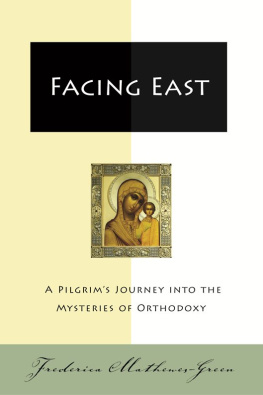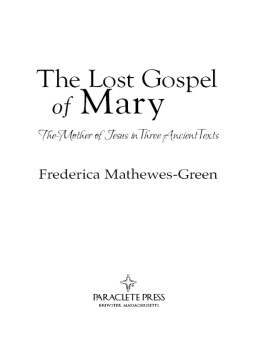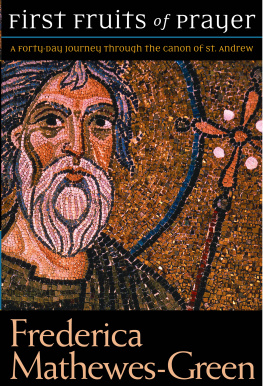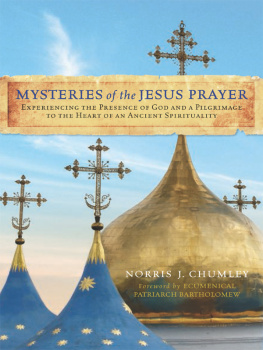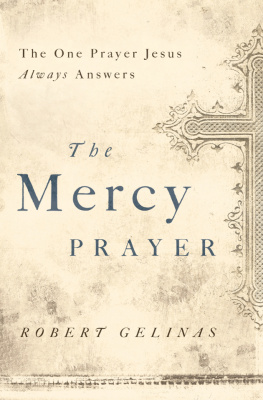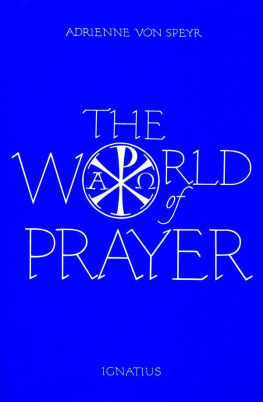The Jesus Prayer
The Jesus Prayer
THE ANCIENT DESERT PRAYER THAT TUNES THE HEART TO GOD

Frederica Mathewes-Green

The Jesus Prayer: The Ancient Desert Prayer That Tunes the Heart to God
2009 First Printing
Copyright 2009 by Frederica Mathewes-Green
ISBN 978-1-55725-659-1
Unless otherwise indicated, all Scripture quotations are taken from the Revised Standard Version of the Bible, copyright 1952 [2nd edition, 1971] by the Division of Christian Education of the National Council of the Churches of Christ in the United States of America. Used by permission. All rights reserved.
Library of Congress Cataloging-in-Publication Data
Mathewes-Green, Frederica.
The Jesus prayer : the ancient desert prayer that tunes the heart to God
/ Frederica Mathewes-Green.
p. cm.
Includes bibliographical references.
ISBN 978-1-55725-659-1
1. Jesus prayer. I. Title.
BT590.J28M38 2009
242.72--dc22
2009025235
10 9 8 7 6 5 4 3 2 1
All rights reserved. No portion of this book may be reproduced, stored in an electronic retrieval system, or transmitted in any form or by any meanselectronic, mechanical, photocopy, recording, or any otherexcept for brief quotations in printed reviews, without the prior permission of the publisher.
Published by Paraclete Press
Brewster, Massachusetts
www.paracletepress.com
Printed in the United States of America
With love to all our grandchildren:
David Benjamin, Hannah, Isaac, Adam, Fintan,
Eudora, Michael, Emmeline, Ruth, Lucas,
and anyone else still to come
May you see your childrens children! (Psalm 128:6)
Contents
Chapter One
HISTORY, SCRIPTURE, AND THE MEANING OF MERCY
Chapter Two
TERMS, CONCEPTS, AND CONTEXT
Chapter Three
HEART, MIND, AND THE LITTLE RADIO
Part Two
GETTING STARTED QUESTIONS AND ANSWERS

Introduction
It was about 2:30 in the morning when I got out of bed last night to pray. I have been doing this since I was pregnant with my first baby, decades ago; I had read somewhere that the middle of the night was a good time to have your daily prayers, with silence before and silence afterward, and no phones to ring. I thought it sounded like a good habit to establish, since Id be getting up with the baby anyway.
Over the years there were three babies, and eventually three teenagers, and now three young-marrieds with babies of their own. Now the household is down to my husband and me again. All these years Ive been getting up in the night to pray. Its a necessity now, and I need it like I need food and light.
About fifteen years ago I started to use the Jesus Prayer during these mid-night hours: Lord Jesus Christ, Son of God, have mercy on me. This very simple prayer was developed in the deserts of Egypt and Palestine during the early centuries of Christian faith, and has been practiced in the Eastern Orthodox Church ever since. It is a prayer inspired by St. Pauls exhortation to pray constantly (1 Thess. 5:17), and its purpose is to tune ones inner attention to the presence of the Lord.
But what is that nameless thing, the inner attention? When we talk about feeling Gods presence, were accustomed to speak as if such experiences arose from our emotions. Yet when I had my rather dramatic conversion experience, decades ago, it sure seemed more objective than that. At the time, the best way I could describe it was to say that a little radio switched on inside me, and I became aware of Christ speaking to me. (It wasnt something I heard with my ears, but by an inner voice, filling my awareness.)
I never knew what to make of that little radio; it didnt fit our familiar division of people into head and heart. But as I began to read the literature of Eastern Christianity, I found that they were familiar with this little radio. They even had a word for it: the nous. Its a word that recurs through the Greek New Testament, but we dont have a good equivalent in English. It gets translated mind, but it doesnt mean the talkative mind, the one that cogitates and constructs theories. It is a receptive capacity of the intellect; we could call it the understanding or the comprehension. The Eastern Church has always known that the nous can be trained to register, or perceive, the voice of God.
That is where the Jesus Prayer comes in. The idea is to spend some time every day practicing the Prayer. You pray it fifty or a hundred times, or more, or less; not robotically but sincerely, speaking to Christ while pulling together your attention to the best of your ability. You get the Prayer going other times, too, whenever you think of it, while waiting at a stoplight or brushing your teeth. This brief, all-purpose, very portable prayer takes root and spreads.
In the process, you hone your ability to discern Gods presence. He is already there, of course; we just arent very good at perceiving it. Practicing the Jesus Prayer helps you sharpen your ability to tune in to his presence, just as you would practice scales to hone your ability to identify musical pitch.
So last night I awoke, as usual, without an alarmsometime in the middle of the night I just swim up to consciousness. I went out into the hallway and stood on the worn spot in the carpet, in front of the bookcase, and looked up at the icon of Christ. A blue light was slanting in the window from my study, filtering between the large, heart-shaped leaves of the catalpa tree. Our street, a simple curve on a hilltop, was still. Sometimes, if I wake up later, I hear an early-rising robin robustly anticipating the dawn (and probably annoying all the other birds, who are still trying to get some shut-eye), but last night it was too early even for him.
I looked into the face of Christ, illuminated softly now by candlelight. I made the sign of the cross. I said some preliminary prayers, including the Lords Prayer and the Nicene Creed, and recited Psalm 51, the prayer that David offered when he repented for seducing Bathsheba and murdering her husband. Ive heard that you should warm up your heart before beginning the Jesus Prayer, and these preliminaries help do that; the Creed reminds me of the majesty of God, while Psalm 51 reminds me of my neediness, my damaged, greedy condition.
After that, I began repeating the Jesus Prayer in my mind, over and over, in an unhurried way: Lord Jesus Christ, have mercy on me. (The words can be varied a bit; I use a shorter version, while the standard form is, Lord Jesus Christ, Son of God, have mercy on me. My husband uses an even longer version, praying, Lord Jesus Christ, Son of the Living God, have mercy on me, a sinner, the last phrase an echo of the tax collectors prayer in Jesus parable.) I aim to say this prayer a hundred times, and keep track by moving my fingers along a prayer rope, a loop of silken cord tied with a hundred elaborate knots. When my mind wanderswhich it does, believe me, over and over every nightI back up a few knots and focus in again.
This practice of saying the Jesus Prayer is accurately termed a spiritual discipline; its a disciplined learning process, like learning to play the cello. It takes perseverance and focused attention. For a cellist, the tedium of practicing scales must appear so distant from the final goal, when that beautiful, dark music will spill forth fluidly. Yet, one day, the cellist will pick up her bow, and she and the instrument will have become one.
Next page

